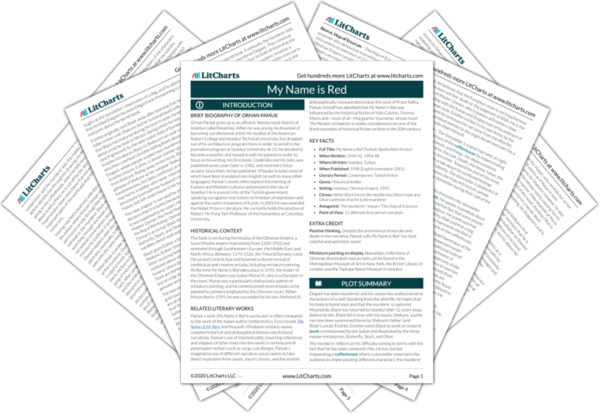Enishte Quotes in My Name is Red
He was frightened because he suddenly understood––and perhaps desired––that Islamic artistry perfected and securely established by the old masters of Herat, would meet its end on account of the appeal of portraiture.
"However, it was as if I too wanted to feel extraordinary different and unique," he said. As if prodded by the Devil, he felt himself strongly drawn to what he feared, "How should I say it? It is as if this were a sin of desire, like growing arrogant before God, like considering oneself of utmost importance, like situating oneself at the center of the world."
“Why did they all believe that painting would bar them from the gates of Heaven?"
"You know quite well why! Because they remembered Our Prophet's warning that on Judgment Day, Allah will punish painters most severely."
"Not painters," corrected Enishte Effendi. "Those who make idols. And this is not from the Koran but from Bukhari."
"On Judgment Day, the idol makers will be asked to bring the images they've created to life," I said cautiously. "Since they'll be unable to do so their lot will be to suffer the torments of Hell. Let it not be forgotten that in the Glorious Koran, ‘creator’ is one of the attributes of Allah. It is Allah who is creative, who brings that which is not into existence, who gives life to the lifeless. No one ought to compete with Him. The greatest of sins is committed by painters who presume to do what He does, who claim to be as creative as He."
The world was faithful to the illustrations and legends that I'd avidly scrutinized over the years. I beheld Creation with awe and surprise as if for the first time, but also as if it'd somehow emerged from my memory. What I called "memory" contained an entire world: With time spread out infinitely before me in both directions, I understood how the world as I first experienced it could persist afterward as memory.
“East and West belong to me.”
Had Enishte Effendi’s book been completed and sent to them, the Venetian masters would've smirked, and their ridicule would’ve reached the Venetian Doge––that is all. They'd have quipped that the Ottomans have given up being Ottoman and would no longer fear us.

Enishte Quotes in My Name is Red
He was frightened because he suddenly understood––and perhaps desired––that Islamic artistry perfected and securely established by the old masters of Herat, would meet its end on account of the appeal of portraiture.
"However, it was as if I too wanted to feel extraordinary different and unique," he said. As if prodded by the Devil, he felt himself strongly drawn to what he feared, "How should I say it? It is as if this were a sin of desire, like growing arrogant before God, like considering oneself of utmost importance, like situating oneself at the center of the world."
“Why did they all believe that painting would bar them from the gates of Heaven?"
"You know quite well why! Because they remembered Our Prophet's warning that on Judgment Day, Allah will punish painters most severely."
"Not painters," corrected Enishte Effendi. "Those who make idols. And this is not from the Koran but from Bukhari."
"On Judgment Day, the idol makers will be asked to bring the images they've created to life," I said cautiously. "Since they'll be unable to do so their lot will be to suffer the torments of Hell. Let it not be forgotten that in the Glorious Koran, ‘creator’ is one of the attributes of Allah. It is Allah who is creative, who brings that which is not into existence, who gives life to the lifeless. No one ought to compete with Him. The greatest of sins is committed by painters who presume to do what He does, who claim to be as creative as He."
The world was faithful to the illustrations and legends that I'd avidly scrutinized over the years. I beheld Creation with awe and surprise as if for the first time, but also as if it'd somehow emerged from my memory. What I called "memory" contained an entire world: With time spread out infinitely before me in both directions, I understood how the world as I first experienced it could persist afterward as memory.
“East and West belong to me.”
Had Enishte Effendi’s book been completed and sent to them, the Venetian masters would've smirked, and their ridicule would’ve reached the Venetian Doge––that is all. They'd have quipped that the Ottomans have given up being Ottoman and would no longer fear us.











